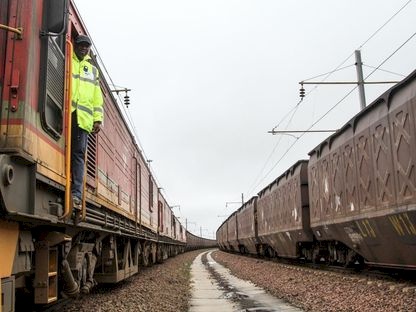
South Africa Opens Rail Network to Private Sector Companies to Save It
SadaNews - The South African government has announced the opening of the national railway network to private sector companies, in a move aimed at improving shipping efficiency and addressing the escalating challenges facing the state-owned "Transnet" company, which operates both the maritime and railway transport sectors in the country.
Transport Minister Barbara Creecy stated that 11 out of 25 companies that applied to operate freight trains have met the technical and administrative criteria and will move on to the negotiation and contracting phase, without disclosing the names of the qualified companies.
This step comes amid a decline in the performance of "Transnet" due to equipment shortages and accumulating maintenance work, alongside increasing cable theft and vandalism, prompting the government to involve the private sector to enhance operational capacity and expand throughput.
Creecy clarified that the new companies will not replace "Transnet", but will complement its role by adding new transport capacity to what the company currently transports.
These companies have received operational permits covering 41 routes, including lines for transporting strategic goods such as coal, iron ore, chrome, manganese, sugar, and fuel.
The contracts with the private companies stipulate the necessity of obtaining safety permits, ensuring vehicle readiness, and the ability to discharge cargo at the ports. The duration of the operational permits ranges from one year to ten years, according to the minister's announcement.
Despite the government providing financial guarantees worth 149 billion rand (about 8.4 billion dollars) to support "Transnet" this year, it acknowledged the limited capacity to fund infrastructure projects and address accumulated transport crises.
The company is seeking additional funding of 35 billion rand to develop its infrastructure during the current year.
Rail freight volumes through "Transnet" decreased to 152 million metric tons in the 2023/2024 financial year, compared to a peak of 226 million tons in 2017/2018.
The government hopes that the involvement of the new companies will contribute to transporting an additional 20 million tons annually starting from the next financial year, as part of a plan aimed at raising freight volume to 250 million tons annually by 2029.
These companies are also expected to add export capacity for coal of up to 10 million tons over the next three years, potentially easing pressure on major mining companies such as "Kumba Iron Ore" and "Thungela Resources", which have had to reduce their production due to "Transnet"'s limited transport capacity.
Source: Reuters

A Dead Man and Injured Due to the SDF Shelling in Hasakah Countryside and Displacement due...

Reports: Death Toll from Protests in Iran May Exceed 10,000

UN Organization: Displacement of 400 Families in Yemen Within 3 Weeks

U.S. Official: We Identify ISIS Prisoners to Transfer the Most Dangerous Ones

Storm "Vern": 21 Dead in America and Power Outages Affecting Over 800,000 Homes

Confirming Continued Support for Palestine.. Saudi Foreign Minister: Our Relations with th...

China Warns Its Citizens Against Traveling to Japan for Lunar New Year Vacation

